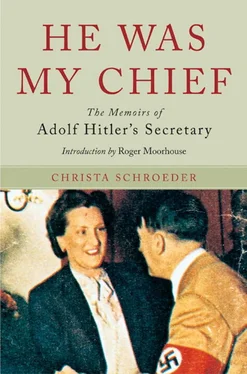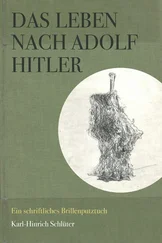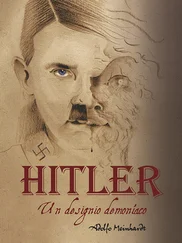Christa Schroeder - He Was My Chief - The Memoirs of Adolf Hitler's Secretary
Здесь есть возможность читать онлайн «Christa Schroeder - He Was My Chief - The Memoirs of Adolf Hitler's Secretary» весь текст электронной книги совершенно бесплатно (целиком полную версию без сокращений). В некоторых случаях можно слушать аудио, скачать через торрент в формате fb2 и присутствует краткое содержание. Город: Barnsley, Год выпуска: 2012, ISBN: 2012, Издательство: Frontline Books, Жанр: История, Биографии и Мемуары, на английском языке. Описание произведения, (предисловие) а так же отзывы посетителей доступны на портале библиотеки ЛибКат.
- Название:He Was My Chief: The Memoirs of Adolf Hitler's Secretary
- Автор:
- Издательство:Frontline Books
- Жанр:
- Год:2012
- Город:Barnsley
- ISBN:978-1-7830-3064-4
- Рейтинг книги:4 / 5. Голосов: 1
-
Избранное:Добавить в избранное
- Отзывы:
-
Ваша оценка:
- 80
- 1
- 2
- 3
- 4
- 5
He Was My Chief: The Memoirs of Adolf Hitler's Secretary: краткое содержание, описание и аннотация
Предлагаем к чтению аннотацию, описание, краткое содержание или предисловие (зависит от того, что написал сам автор книги «He Was My Chief: The Memoirs of Adolf Hitler's Secretary»). Если вы не нашли необходимую информацию о книге — напишите в комментариях, мы постараемся отыскать её.
He Was My Chief: The Memoirs of Adolf Hitler's Secretary — читать онлайн бесплатно полную книгу (весь текст) целиком
Ниже представлен текст книги, разбитый по страницам. Система сохранения места последней прочитанной страницы, позволяет с удобством читать онлайн бесплатно книгу «He Was My Chief: The Memoirs of Adolf Hitler's Secretary», без необходимости каждый раз заново искать на чём Вы остановились. Поставьте закладку, и сможете в любой момент перейти на страницу, на которой закончили чтение.
Интервал:
Закладка:
I noted later:
Entertainment: every evening cinema, afternoons tea-house. Politics never discussed. Hitler’s influence was felt everywhere: either nobody had a private opinion or feared to express it. Whoever dared was cold-shouldered. Hitler was the driving force for everybody in his environment.
Before the disaster at Stalingrad on 2 February 1943 Hitler would organise an evening of record music from time to time. His favourites were Beethoven symphonies, extracts from Wagner operas, and songs by Hugo Wolf. He would then sit, eyes closed, listening to the music. It was always the same records which were played and the tea-hour guests knew the catalogue numbers by heart. If Hitler said: ‘ Aida , last act, Es hat der Stein sich über uns geschlossen ’, then one of the guests would call to the waiter: ‘Record number 123.’
After Stalingrad, Hitler could no longer relax to music. Then we spent the evenings listening to his monologues. These were invariable: his youth in Vienna, the years of struggle, the history of humanity, macrocosmos◦– microcosmos and so on. On most topics we knew what was coming next and so the evenings required endurance. World events, the battle front: these were not to be discussed during the tea hour, and in fact anything connected to the war was taboo. It was advisable to broach innocuous themes such as his shepherd dog Blondi’s turbulent behaviour and disobedience, or the adventures of the cat which suddenly appeared at FHQ Wolfsschanze one day. He did not actually like cats, apparently because they went for birds, but he gradually accepted ‘Peter’ to the extent that in the end he would get jealous if the cat selected somebody else’s lap to sit on. His jealousy for Blondi was evident from his anger should the dog take an interest in anybody else. He would then tend to suspect that the dog’s affections had been undermined by a titbit of meat, an act which was strictly forbidden. According to Hitler, it was useless for anybody else to seek Blondi’s affections, for her devotion was limited to him alone.
After breakfast every morning Hitler walked Blondi in the wild area around his bunker. He was very fond of the dog which he entrusted to a keeper (Tarnow). She was a very docile and clever dog, able to do some tricks such as balancing on a pole, jumping a two-metre high wall and climb a ladder. Hitler had no time for smaller dogs. Eva Braun’s two Scotch terriers Negus and Stasi he denigrated as ‘hand-lickers’, to which their owner responded: ‘Blondi is a calf ’.
How fortunate, [I wrote to my friend,] that we have a cat which often comes to sit and whose funny little games◦– making us aware of a change in his situation◦– are something we are grateful for when the conversation palls. I like it especially when he jumps onto my lap, for then I place my aching hands under his soft warm fur: that feels good. We do have a Scotch terrier as well but nobody fawns over him because he is recalcitrant and obstinate (and the boss has sworn never to be photographed with him because the terrier looks like a ‘hand-licker’). He is not allowed into the talk circle because of the cat but even when he is absent he enlivens the conversation…
Many interesting subjects were addressed which one can read in Heim’s Monologe . Hitler would often speak about the Japanese. ‘I am accused of sympathising with the Japanese’, he said, ‘but what does sympathising mean? The Japanese are yellow-skinned and slit-eyed, but they are fighting against Britain and the United States and that makes them useful to Germany. In that sense I sympathise with them.’ After the fall of Singapore to the Japanese, Ribbentrop appeared before Hitler to deliver a report. Ribbentrop intended to make a big thing of it with the radio and press. In the small bunker office Hitler told him: ‘I am not in favour of overdoing this, Ribbentrop. One has to think of the time centuries ahead when we shall have to settle the score with the yellow race.’
Hitler often spoke of people in his wider circle. Of Speer he once remarked:
He is an artist and his soul is linked to mine. I have the closest human relationship towards him because I understand him so well. He is a man of architecture as I am, intelligent, modest and not a dour military head. I did not think he would master his great objective so well, but he has a great talent for organisation and grew to the task. If I show Speer a plan and give him the job, he reflects a while and then says: ‘ Ja, mein Führer , I believe it is possible’, or he objects: ‘ Nein , it cannot be done like that’ and then provides the full reason.
Speer was a convinced follower of Hitler and even in internment I could see how deeply Hitler’s words ‘I take full responsibility for everything!’ still had their effect on him. This promise extinguished all feelings of guilt in Hitler’s followers, and imbued in them a kind of faith equivalent to belief in God. While Hitler lived, Speer saw in him ‘The Extraordinary’, but with Hitler’s death Speer’s fascination for Hitler died too.
Hitler also spoke frequently about photographer Heinrich Hoffmann. ‘Hoffmann was once a crazy young man’, he told me, ‘then he was still slim and agile and went tirelessly about his work with his complicated old apparatus. He had to slip under the black cloth and go through the most neck-breaking operations with the heavy camera to get good photos.’ Hoffmann liked his drink. Hitler told him once: ‘Hoffmann, your nose looks like a rotten cucumber. I think that if I put a lighted match to your breath it would explode, and soon red wine will replace blood completely in your arteries.’ This was said after Hoffmann turned up the worse for drink at the dining table. He had not done so before in Hitler’s presence, and it shocked Hitler to see Hoffmann in such a state. Finally he ordered Schaub and Bormann: ‘Please ensure that Professor Hoffmann is sober when in my presence. I have invited him so that we can converse, and not so that he can let himself go.’ How wounded Hitler must have been only became clear much later.
Professor Hoffmann collected nineteenth-century paintings and bought up all the watercolours Hitler had painted. On visits to his villa on Munich’s Ebersberg-Strasse he never neglected to show them. He was extraordinarily proud of the collection. I also remember conversations in which Hitler told Hoffmann not to pay such exorbitant sums for his watercolours since he himself had only received 20 or 30 RM for each. What became of Professor Hoffmann’s collection is a mystery, but I think it probably finished up together with all the other paintings and works of art which I saved from destruction at the Berghof after the war. A footnote about a conversation between Hitler and Professor Hoffmann on 12 March 1944 at the Berghof which I noted down indicates Hitler’s attitude to his earlier works:
Obersalzberg, 12 March 1944 Rü/Wag
During lunch today Professor Hoffmann showed Hitler a watercolour painted by the Führer in 1910. Professor Hoffmann obtained the picture recently in Vienna.
Der Führer:Hoffmann, I hope you did not buy that picture?
Hoffmann:I received it as a gift, that is to say, the seller told me that for the price it is a gift.
Der Führer:Even today these things should not fetch more than 150 to 200 RM. It is madness if one pays more. It was not my ambition to be a painter. I only painted these things to support myself in my studies. I would not have received much over 12 RM then. I only ever painted enough to cover my necessities; 80 RM would have kept me for a month; 1 RM would have bought me lunch and supper. I used to study all night. My architectural sketches which I made then, those were my most precious possessions, the fruit of my mental efforts which I would never sell as I did the paintings. One should not forget that all my thinking today, my architectural plans, evolved from the concepts created in night-long work in those years. If I am in a position today to sketch the ground plan of a theatre, it is not done by me while in a trance, it is exclusively the result of my earlier studies. Unfortunately nearly all my sketches of that time are lost to me…!
Читать дальшеИнтервал:
Закладка:
Похожие книги на «He Was My Chief: The Memoirs of Adolf Hitler's Secretary»
Представляем Вашему вниманию похожие книги на «He Was My Chief: The Memoirs of Adolf Hitler's Secretary» списком для выбора. Мы отобрали схожую по названию и смыслу литературу в надежде предоставить читателям больше вариантов отыскать новые, интересные, ещё непрочитанные произведения.
Обсуждение, отзывы о книге «He Was My Chief: The Memoirs of Adolf Hitler's Secretary» и просто собственные мнения читателей. Оставьте ваши комментарии, напишите, что Вы думаете о произведении, его смысле или главных героях. Укажите что конкретно понравилось, а что нет, и почему Вы так считаете.












